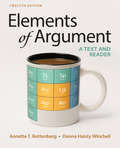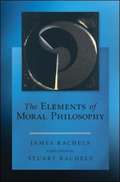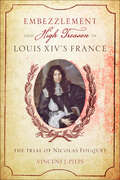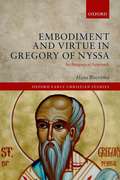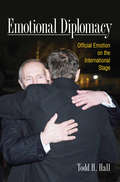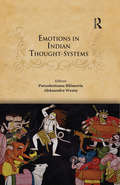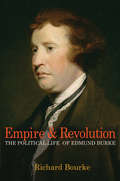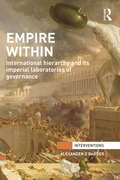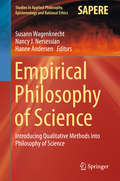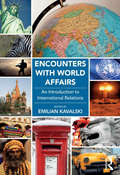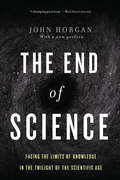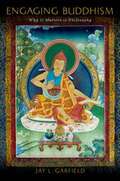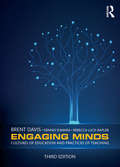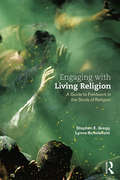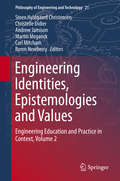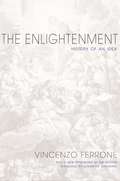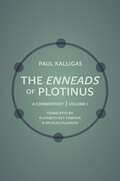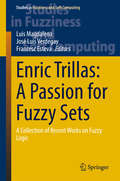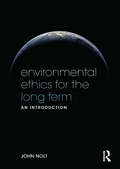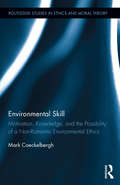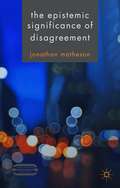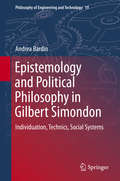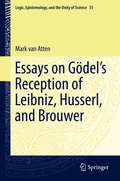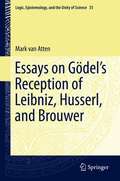- Table View
- List View
Elements of Argument
by Annette T. Rottenberg Donna Haisty WinchellElements of Argument teaches students how to approach, develop, and defend arguments one element at a time. This comprehensive, accessible text carefully scaffolds argument for students, explaining approaches to argumentation, (including Aristotelian, Toulmin, and Rogerian models as well as Stasis Theory questions), critical reading, and argument analysis. The major components of argumentation--claims, support, assumptions, logic--are explained in depth, and a robust research section shows students how to find, incorporate, and build on existing arguments. This Twelfth Edition has also been updated with more sourced readings than ever before, further reinforcing the importance of research and synthesis. Finally, the anthology includes debates and casebooks on unsettled current issues as well as timeless, classic arguments, making Elements of Argument a comprehensive resource for the argument classroom.
The Elements of Moral Philosophy 8th Edition
by James Rachels Stuart RachelsThe Elements of Moral Philosophy by James Rachels and Stuart Rachels is a best-selling text for undergraduate courses in ethics. Thirteen thought-provoking chapters introduce readers to major moral concepts and theories in philosophy through clear, understandable explanations and compelling discussions.
Embezzlement and High Treason Louis XIV's France: The Trial of Nicolas Fouquet
by Vincent J. PittsA look at life in the court of King Louis XIV, the politics of the time, and the trial of a man who knew too much for his own good.From 1661 to 1664, France was mesmerized by the arrest and trial of Nicolas Fouquet, the country’s superintendent of finance. Prosecuted on trumped-up charges of embezzlement, mismanagement of funds, and high treason, Fouquet managed to exonerate himself from all the major charges over the course of three long years, in the process embarrassing and infuriating Louis XIV. The young king overturned the court’s decision and sentenced Fouquet to lifelong imprisonment in a remote fortress in the Alps.A dramatic critique of absolute monarchy in pre-revolutionary France, Embezzlement and High Treason in Louis XIV’s France tells the gripping tale of an overly ambitious man who rose rapidly in the state hierarchy—then overreached. Vincent J. Pitts uses the trial as a lens through which to explore the inner workings of the court of Louis XIV, who rightly feared that Fouquet would expose the tawdry financial dealings of the king’s late mentor and prime minister, Cardinal Mazarin.“A compelling account of a political drama in mid-seventeenth century France, but it is also a window into the process by which rule of law gradually became established . . . [and] I thoroughly enjoyed reading it.” —EH.Net“Pitts’s book examines the show trial of Fouquet, and…the political process that created such an unfair outcome for a man who is often seen as one of the most well-known scapegoats in French history. Pitts has succeeded masterfully in weaving a powerful narrative that exposes convoluted corruption and mismanagement of ancient régime France.” —Renaissance Quarterly
Embodiment And Virtue In Gregory Of Nyssa: An Anagogical Approach (Oxford Early Christian Studies)
by Hans Boersma<P>Embodiment in the theology of Gregory of Nyssa is a much-debated topic. Hans Boersma argues that this - worldly realities of time and space, which include embodiment, are not the focus of Gregory's theology. Instead, embodiment plays a distinctly subordinate role. The key to his theology, Boersma suggests, is anagogy, going upward in order to participate in the life of God. <P>This book looks at a variety of topics connected to embodiment in Gregory's thought: time and space; allegory; gender, sexuality, and virginity; death and mourning; slavery, homelessness, and poverty; and the church as the body of Christ. In each instance, Boersma maintains, Gregory values embodiment only inasmuch as it enables us to go upward in the intellectual realm of the heavenly future. <P>Boersma suggests that for Gregory embodiment and virtue serve the anagogical pursuit of otherworldly realities. Countering recent trends in scholarship that highlight Gregory's appreciation of the goodness of creation, this book argues that Gregory looks at embodiment as a means for human beings to grow in virtue and so to participate in the divine life. <P>It is true that, as a Christian thinker, Gregory regards the creator-creature distinction as basic. But he also works with the distinction between spirit and matter. And Nyssen is convinced that in the hereafter the categories of time and space will disappear - while the human body will undergo an inconceivable transformation. This book, then, serves as a reminder of the profoundly otherworldly cast of Gregory's theology.
Emotional Diplomacy: Official Emotion on the International Stage
by Todd H. HallIn Emotional Diplomacy, Todd H. Hall explores the politics of officially expressed emotion on the international stage, looking at the ways in which state actors strategically deploy emotional behavior to shape the perceptions of others. Examining diverse instances of emotional behavior, Hall reveals that official emotional displays are not simply cheap talk but rather play an important role in the strategies and interactions of state actors. Emotional diplomacy is more than rhetoric; as this book demonstrates, its implications extend to the provision of economic and military aid, great-power cooperation, and even the use of armed force. Emotional Diplomacy provides the theoretical tools necessary for understanding the nature and significance of state-level emotional behavior and offers new observations of how states seek reconciliation, strategically respond to unforeseen crises, and demonstrate resolve in the face of perceived provocations. Hall investigates three specific strands of emotional diplomacy: those rooted in anger, sympathy, and guilt. Presenting original research drawing on sources and interviews in five different languages, Hall provides new insights into the 1995–1996 Taiwan Strait Crisis, the post-9/11 reactions of China and Russia, and relations between West Germany and Israel after World War II. He also demonstrates how his arguments can be extended to further cases ranging from Sino-Japanese relations to diplomatic interactions in Latin America. Emotional Diplomacy offers a unique take on the intersection of strategic action and emotional display, offering a means for making sense of why states appear to behave emotionally.
Emotions in Indian Thought-Systems
by Purushottama Bilimoria; Aleksandra WentaA stimulating account of the wide range of approaches towards conceptualising emotions in classical Indian philosophical–religious traditions, such as those of the Upanishads, Vaishnava Tantrism, Bhakti movement, Jainism, Buddhism, Yoga, Shaivism, and aesthetics, this volume analyses the definition and validity of emotions in the construction of
Empire and Revolution
by Richard BourkeEdmund Burke (1730-97) lived during one of the most extraordinary periods of world history. He grappled with the significance of the British Empire in India, fought for reconciliation with the American colonies, and was a vocal critic of national policy during three European wars. He also advocated reform in Britain, pressed for constitutional change in Ireland, and became a central protagonist in the great debate on the French Revolution. Drawing on the complete range of printed and manuscript sources, Empire and Revolution offers a vivid reconstruction of the major concerns of this outstanding statesman, orator, and philosopher.In restoring Burke to his original political and intellectual context, this book strips away the accumulated distortions that have marked the reception of his ideas. In the process, it overturns the conventional picture of a partisan of tradition against progress. In place of the image of a backward-looking opponent of popular rights, it presents a multifaceted portrait of one of the most captivating figures in eighteenth-century life and thought. While Burke was a passionately energetic statesman, he was also a deeply original thinker. Empire and Revolution depicts him as a philosopher-in-action who evaluated the political realities of the day through the lens of Enlightenment thought, variously drawing on the ideas of such figures as Montesquieu, Rousseau, and Hume.A boldly ambitious work of scholarship, this book challenges us to rethink the legacy of Burke and the turbulent era in which he played so pivotal a role.
Empire of Chance
by Anders Engberg-PedersenAnders Engberg-Pedersen shows how the Napoleonic Wars inspired a new discourse on knowledge in the West. Soldiers returning from battle were forced to reconsider what it is possible to know and how decisions are made in a fog of imperfect knowledge. Chance no longer appeared exceptional but normative--a prism for understanding the modern world.
Empire Within: International Hierarchy and its Imperial Laboratories of Governance (Interventions)
by Alexander D BarderThis book explores the reverberating impacts between historical and contemporary imperial laboratories and their metropoles through three case studies concerning violence, surveillance and political economy. The invasions of Afghanistan in 2001 and Iraq in 2003 forced the United States to experiment and innovate in considerable ways. Faced with growing insurgencies that called into question its entire mission, the occupation authorities engaged in a series of tactical and technological innovations that changed the way it combated insurgents and managed local populations. The book presents new material to develop the argument that imperial and colonial contexts function as a laboratory in which techniques of violence, population control and economic principles are developed which are subsequently introduced into the domestic society of the imperial state. The text challenges the widely taken for granted notion that the diffusion of norms and techniques is a one-way street from the imperial metropole to the dependent or weak periphery. This work will be of great interest to scholars of international relations, critical security studies and international relations theory.
Empirical Philosophy of Science
by Susann Wagenknecht Nancy J. Nersessian Hanne AndersenThe book examines the emerging approach of using qualitative methods, such as interviews and field observations, in the philosophy of science. Qualitative methods are gaining popularity among philosophers of science as more and more scholars are resorting to empirical work in their study of scientific practices. At the same time, the results produced through empirical work are quite different from those gained through the kind of introspective conceptual analysis more typical of philosophy. This volume explores the benefits and challenges of an empirical philosophy of science and addresses questions such as: What do philosophers gain from empirical work? How can empirical research help to develop philosophical concepts? How do we integrate philosophical frameworks and empirical research? What constraints do we accept when choosing an empirical approach? What constraints does a pronounced theoretical focus impose on empirical work? Nine experts discuss their thoughts and empirical results in the chapters of this book with the aim of providing readers with an answer to these questions.
Encounters with World Affairs: An Introduction to International Relations (Worlding Beyond The West Ser.)
by Emilian KavalskiThis book is designed to familiarise students with leading International Relations (IR) theories and their explanation of political events, phenomena, and processes which cross the territorial boundaries of the state. Thus, students will be exposed to the interplay between power, interest, ideas, identity, and resistance, in explaining continuity and change in international relations. Developed to provide students with the analytical tools and intellectual frameworks needed to understand the behaviour of different international actors in contemporary global affairs. This textbook responds to the challenges of a dynamic job market by assisting students to gain both thorough theoretical knowledge and training them to apply this knowledge to real world problems. In short, this textbook delivers: A comprehensive and interdisciplinary approach to the examination of national, regional and global trends in politics, economics and socio-cultural developments allowing students to understand: ¢ the practice and theory of contemporary international relations ¢ the politics, culture, history, and economies of different regions around the world ¢ the role played by international interactions, culture, and government in local, national, and global settings. Equipping students with the proficiency: ¢ to understand and interpret the dynamics, patterns, and issues of global affairs ¢ to know how to get more information about particular questions ¢ to evaluate that information independently and effectively. To these ends, the textbook provides a number of features that will appeal to students and avoids overwhelming students with chapters on topics which (in practice) are rarely on courses, while nonetheless providing a comprehensive overview of the field. Introduces students to the main debates, topics, and terms in the field and allows them to decide which they would like to focus on in their further studies.
The End of Science: Facing The Limits Of Knowledge In The Twilight Of The Scientific Age
by John HorganIn The End of Science, John Horgan makes the case that the era of truly profound scientific revelations about the universe and our place in it is over. Interviewing scientific luminaries such as Stephen Hawking, Francis Crick, and Richard Dawkins, he demonstrates that all the big questions that can be answered have been answered, as science bumps up against fundamental limits. The world cannot give us a "theory of everything,” and modern endeavors such as string theory are "ironic” and "theological” in nature, not scientific, because they are impossible to confirm. Horgan’s argument was controversial in 1996, and it remains so today, still firing up debates in labs and on the internet, not least because--as Horgan details in a lengthy new introduction--ironic science is more prevalent than ever. Still, while Horgan offers his critique, grounded in the thinking of the world’s leading researchers, he offers homage, too. If science is ending, he maintains, it is only because it has done its work so well.
Engaging Buddhism: Why It Matters to Philosophy
by Jay L. GarfieldThis is a book for scholars of Western philosophy who wish to engage with Buddhist philosophy, or who simply want to extend their philosophical horizons. It is also a book for scholars of Buddhist studies who want to see how Buddhist theory articulates with contemporary philosophy. <p><p> Engaging Buddhism: Why it Matters to Philosophy articulates the basic metaphysical framework common to Buddhist traditions. It then explores questions in metaphysics, the philosophy of mind, phenomenology, epistemology, the philosophy of language and ethics as they are raised and addressed in a variety of Asian Buddhist traditions. In each case the focus is on philosophical problems; in each case the connections between Buddhist and contemporary Western debates are addressed, as are the distinctive contributions that the Buddhist tradition can make to Western discussions. <p><p> Engaging Buddhism is not an introduction to Buddhist philosophy, but an engagement with it, and an argument for the importance of that engagement. It does not pretend to comprehensiveness, but it does address a wide range of Buddhist traditions, emphasizing the heterogeneity and the richness of those traditions. The book concludes with methodological reflections on how to prosecute dialogue between Buddhist and Western traditions.
Engaging Minds: Cultures of Education and Practices of Teaching
by Brent Davis Dennis Sumara Rebecca Luce-KaplerEngaging Minds: Cultures of Education and Practices of Teaching explores the diverse beliefs and practices that define the current landscape of formal education. The 3rd edition of this introduction to interdisciplinary studies of teaching and learning to teach is restructured around four prominent historical moments in formal education: Standardized Education, Authentic Education, Democratic Citizenship Education, Systemic Sustainability Education. These moments serve as the foci of the four sections of the book, each with three chapters dealing respectively with history, epistemology, and pedagogy within the moment. This structure makes it possible to read the book in two ways – either "horizontally" through the four in-depth treatments of the moments or "vertically" through coherent threads of history, epistemology, and pedagogy. Pedagogical features include suggestions for delving deeper to get at subtleties that can’t be simply stated or appreciated through reading alone, several strategies to highlight and distinguish important vocabulary in the text, and more than 150 key theorists and researchers included among the search terms and in the Influences section rather than a formal reference list.
Engaging with Living Religion: A Guide to Fieldwork in the Study of Religion
by Stephen E. Gregg Lynne ScholefieldUnderstanding living religion requires students to experience everyday religious practice in diverse environments and communities. This guide provides the ideal introduction to fieldwork and the study of religion outside the lecture theatre. Covering theoretical and practical dimensions of research, the book helps students learn to ‘read’ religious sites and communities, and to develop their understanding of planning, interaction, observation, participation and interviews. Students are encouraged to explore their own expectations and sensitivities, and to develop a good understanding of ethical issues, group-learning and individual research. The chapters contain student testimonies, examples of student work and student-led questions.
Engineering Identities, Epistemologies and Values
by Steen Hyldgaard Christensen Christelle Didier Andrew Jamison Martin Meganck Carl Mitcham Byron NewberryThis second companion volume on engineering studies considers engineering practice including contextual analyses of engineering identity, epistemologies and values. Key overlapping questions examine such issues as an engineering identity, engineering self-understandings enacted in the professional world, distinctive characters of engineering knowledge and how engineering science and engineering design interact in practice. Authors bring with them perspectives from their institutional homes in Europe, North America, Australia\ and Asia. The volume includes 24 contributions by more than 30 authors from engineering, the social sciences and the humanities. Additional issues the chapters scrutinize include prominent norms of engineering, how they interact with the values of efficiency or environmental sustainability. A concluding set of articles considers the meaning of context more generally by asking if engineers create their own contexts or are they created by contexts. Taken as a whole, this collection of original scholarly work is unique in its broad, multidisciplinary consideration of the changing character of engineering practice.
The Enlightenment: History of an Idea - Updated Edition
by Elisabetta Tarantino Vincenzo FerroneIn this concise and powerful book, one of the world's leading historians of the Enlightenment provides a bracing and clarifying new interpretation of this watershed period. Arguing that philosophical and historical views of the era have long been hopelessly confused, Vincenzo Ferrone makes the case that it is only by separating these views and taking an approach grounded in social and cultural history that we can begin to grasp what the Enlightenment was--and why it is still relevant today.Examining Kant, Hegel, Marx, Nietzsche, Horkheimer, Adorno, Foucault, and Pope Benedict XVI, Ferrone shows how transhistorical, philosophical interpretations of the Enlightenment have diverged from ones based on careful historical reconstructions of the ideas, practices, and institutions of eighteenth-century Europe. He then offers a new reading of the Enlightenment, arguing that it was "the laboratory of modernity," a profound and wide-ranging cultural revolution that reshaped Western identity, reformed politics through the invention of human rights, and redefined knowledge by creating a critical culture. Not confined to a group of radical elites, these new ways of thinking gave birth to new values that spread throughout society and changed how everyday life was lived and thought of.Original and provocative, The Enlightenment provides a compelling reevaluation of the true nature and legacy of one of the most important and contested periods in Western history. And, in a new afterword, Ferrone describes how his argument challenges the work of Anglophone interpreters of the Enlightenment, including Jonathan Israel.The translation of this work has been funded by SEPS--Segretariato Europeo per le Pubblicazioni Scientifiche.
The Enneads of Plotinus, Volume 1: A Commentary
by Paul KalligasThe first volume in a landmark commentary on an important and influential work of ancient philosophyThis is the first volume of a groundbreaking commentary on one of the most important works of ancient philosophy, the Enneads of Plotinus—a text that formed the basis of Neoplatonism and had a deep influence on early Christian thought and medieval and Renaissance philosophy. This volume covers the first three of the six Enneads, as well as Porphyry's Life of Plotinus, a document in which Plotinus’s student—the collector and arranger of the Enneads—introduces the philosopher and his work. A landmark contribution to modern Plotinus scholarship, Paul Kalligas’s commentary is the most detailed and extensive ever written for the whole of the Enneads.For each of the treatises in the first three Enneads, Kalligas provides a brief introduction that presents the philosophical background against which Plotinus’s contribution can be assessed; a synopsis giving the main lines and the articulation of the argument; and a running commentary placing Plotinus’s thought in its intellectual context and making evident the systematic association of its various parts with each other.
Enric Trillas: A Passion for Fuzzy Sets
by Luis Magdalena José Luis Verdegay Francesc Esteva(Preliminary) The book is a comprehensive collection of the most recent and significant research and applications in the field of fuzzy logic. It covers fuzzy structures, systems, rules, operations as well as important applications, e. g in decision making, environmental prediction and prevention, and communication. It is dedicated to Enric Trillas as an acknowledgement for his pioneering research in the field. The book include a foreword by Lotfi A. Zadeh.
Environmental Ethics for the Long Term: An Introduction
by John NoltBroad in scope, this introduction to environmental ethics considers both contemporary issues and the extent of humanity's responsibility for distant future life. John Nolt, a logician and environmental ethicist, interweaves contemporary science, logical analysis, and ethical theory into the story of the expansion of ethics beyond the human species and into the far future. Informed by contemporary environmental science, the book deduces concrete policy recommendations from carefully justified ethical principles and ends with speculations concerning the deepest problems of environmental ethics. Pedagogical features include chapter outlines, annotated suggestions for further readings, the explanations of key terms when first mentioned, and an extensive glossary.
Environmental Skill: Motivation, Knowledge, and the Possibility of a Non-Romantic Environmental Ethics (Routledge Studies in Ethics and Moral Theory)
by Mark CoeckelberghToday it is widely recognized that we face urgent and serious environmental problems and we know much about them, yet we do very little. What explains this lack of motivation and change? Why is it so hard to change our lives? This book addresses this question by means of a philosophical inquiry into the conditions of possibility for environmental change. It discusses how we can become more motivated to do environmental good and what kind of knowledge we need for this, and explores the relations between motivation, knowledge, and modernity. After reviewing a broad range of possible philosophical and psychological responses to environmental apathy and inertia, the author argues for moving away from a modern focus on either detached reason and control (Stoicism and Enlightenment reason) or the natural, the sentiments, and the authentic (Romanticism), both of which make possible disengaging and alienating modes of relating to our environment. Instead he develops the notion of environmental skill: a concept that bridges the gap between knowledge and action, re-interprets environmental virtue, and suggests an environmental ethics centered on experience, know-how and skillful engagement with our environment. The author then explores the implications of this ethics for our lives: it changes the way we think about , and deal with, health, food, animals, energy, climate change, politics, and technology.
The Epistemic Significance of Disagreement
by Jonathan MathesonDiscovering someone disagrees with you is a common occurrence. The question of epistemic significance of disagreement concerns how discovering that another disagrees with you affects the rationality of your beliefs on that topic. This book examines the answers that have been proposed to this question, and presents and defends its own answer.
Epistemology and Political Philosophy in Gilbert Simondon
by Andrea BardinThis combination of historiography and theory offers the growing Anglophone readership interested in the ideas of Gilbert Simondon a thorough and unprecedented survey of the French philosopher's entire oeuvre. The publication, which breaks new ground in its thoroughness and breadth of analysis, systematically traces the interconnections between Simondon's philosophy of science and technology on the one hand, and his political philosophy on the other. The author sets Simondon's ideas in the context of the epistemology of the late 1950s and the 1960s in France, the milieu that shaped a generation of key French thinkers such as Deleuze, Foucault and Derrida. This volume explores Simondon's sources, which were as eclectic as they were influential: from the philosophy of Bergson to the cybernetics of Wiener, from the phenomenology of Merleau-Ponty to the epistemology of Canguilhem, and from Bachelard's philosophy of science to the positivist sociology and anthropology of luminaries such as Durkheim and Leroi-Gourhan. It also tackles aspects of Simondon's philosophy that relate to Heidegger and Elull in their concern with the ontological relationship between technology and society and discusses key scholars of Simondon such as Barthélémy, Combes, Stiegler, and Virno, as well as the work of contemporary protagonists in the philosophical debate on the relevance of technique. The author's intimate knowledge of Simondon's language allows him to resolve many of th e semantic errors and misinterpretations that have plagued reactions to Simondon's many philosophical neologisms, often drawn from his scientific studies.
Essays on Go del's Reception of Leibniz, Husserl, and Brouwer
by Mark AttenThis volume tackles Gödel's two-stage project of first using Husserl's transcendental phenomenology to reconstruct and develop Leibniz' monadology, and then founding classical mathematics on the metaphysics thus obtained. The author analyses the historical and systematic aspects of that project, and then evaluates it, with an emphasis on the second stage. The book is organised around Gödel's use of Leibniz, Husserl and Brouwer. Far from considering past philosophers irrelevant to actual systematic concerns, Gödel embraced the use of historical authors to frame his own philosophical perspective. The philosophies of Leibniz and Husserl define his project, while Brouwer's intuitionism is its principal foil: the close affinities between phenomenology and intuitionism set the bar for Gödel's attempt to go far beyond intuitionism. The four central essays are `Monads and sets', `On the philosophical development of Kurt Gödel', `Gödel and intuitionism', and `Construction and constitution in mathematics'. The first analyses and criticises Gödel's attempt to justify, by an argument from analogy with the monadology, the reflection principle in set theory. It also provides further support for Gödel's idea that the monadology needs to be reconstructed phenomenologically, by showing that the unsupplemented monadology is not able to found mathematics directly. The second studies Gödel's reading of Husserl, its relation to Leibniz' monadology, and its influence on his publishe d writings. The third discusses how on various occasions Brouwer's intuitionism actually inspired Gödel's work, in particular the Dialectica Interpretation. The fourth addresses the question whether classical mathematics admits of the phenomenological foundation that Gödel envisaged, and concludes that it does not. The remaining essays provide further context. The essays collected here were written and published over the last decade. Notes have been added to record further thoughts, changes of mind, connections between the essays, and updates of references.
Essays on Gödel's Reception of Leibniz, Husserl, and Brouwer
by Mark Van AttenThe book is organised around Gödel's use of Leibniz, Husserl and Brouwer. The four central essays are `Monads and sets', `On the philosophical development of Kurt Gödel', `Gödel and intuitionism', and `Construction and constitution in mathematics'.
